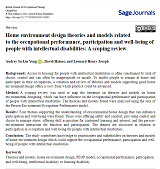Home environment design theories and models related to the well-being of people with intellectual disabilities: A scoping review

Published by Sage Journals, this scoping review highlights how access to housing for people with intellectual disabilities is often constrained by lack of choice, control and can often be inappropriate or unsafe.
Mapping the literature on theories and models on home environmental designing, which can have influence on the occupational performance and participation of people with intellectual disabilities, the theories and models found were analysed using the lens of the Person-Environment-Occupation-Performance model.
Four themes supporting the understanding of environmental home design that can influence participation and well-being were found:
- offering safety and comfort;
- providing control and choice to manage stress;
- offering skill acquisition for continued learning and interest;
- and the person–environment interaction for function and participation.
The themes are discussed in relation to participation in occupation and well-being for people with intellectual disabilities.
The study contributes knowledge to practitioners and stakeholders on theories and models of home environment design which could support the occupational performance, participation and well-being of people with intellectual disabilities.
